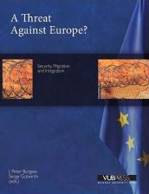
A THREAT AGAINST EUROPE? Security, Migration and Integration
A new book has just been released by VUBPress, edited by PRIOs J. Peter Burgess and Serge Gutwirth (Vrije Universiteit Brussel). PRIOs Jørgen Carling contributes with a chapter on unwanted immigration.
Full details: http://www.aspeditions.be/article.aspx?article_id=ATHREA528V&langue=en-gb
The concept of security has traditionally referred to the status of sovereign states in a closed international system. In this system the state is assumed to be both the object of security and the primary provider of security. Threats to the state’s security are understood as threats to its political autonomy in the system. The major international institutions that emerged after the Second World War were built around this idea. When the founders of the United Nations spoke of collective security, they were referring primarily to state security and to the coordinated system that would be necessary in order to avoid the 'scourge of war'. But today, a wide range of security threats, both new and traditional, confront Europe, or at least as some would say. New forms of nationalism, ethnic conflict and civil war, information technology, biological and chemical warfare, resource conflicts, pandemics, mass migrations, transnational terrorism, and environmental dangers challenge, according to many, the limits of our ability to safeguard the values upon which European society is based.
This book will provided theory and empirical case detail on several primary issues:
First, one form or another of insecurity motivates the movement of migrants motivating them to internal displacement or to sometimes risky trips to other countries. The correlation between the conditions of economic, health, food and military insecurity can be directly correlated with patterns of migration on a regional and global scale.
Second, some people become insecure while they are on the move. This is particularly the case for irregular migrants. Greater risks are being taken by people trying to move illegally from poorer to richer parts of the world, for example crossing the Mexico-United States border or the Mediterranean from North Africa to Southern Europe. A specific category of irregular migrants for whom this is often the case includes the victims of migrant smugglers and human traffickers. Another category of concern in this context includes those who become stranded in transit countries.
Third, certain migrants are also insecure in their destination countries. This is particularly the case of irregular migrants who work illegally and are often subject to exploitation. Often their jobs are dirty, dangerous and difficult, jobs that nationals are unwilling to take. The victims of human trafficking - andimportant migrant group - are not free to decide on the activities in which they engage. They are often forced into low-paid, insecure and degrading work from which they may find it impossible to escape and for which they receive trivial or no compensation. Finally, and more generally, many migrants, including those living and working in a regular manner, experience marginalization or discrimination.





